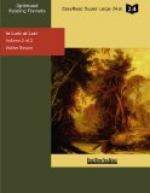An old tutor by correspondence may be, and very likely is, indifferent about his pupils, because he has had so many; but Iris was a young tutor, and had as yet known few. One of her pupils, for instance, was a gentleman in the fruit and potato line, in the Borough. By reason of his early education, which had not been neglected so much as entirely omitted, he was unable to personally conduct his accounts. Now a merchant without his accounts is as helpless as a tourist without his Cook. So that he desired, in his mature age, to learn book keeping, compound addition, subtraction, and multiplication. He had no partners, so that he did not want division. But it is difficult—say, well-nigh impossible—for a middle-aged merchant, not trained in the graces of letter-writing, to inspire a young lady with personal regard, even though she is privileged to follow the current of his thoughts day by day, and to set him his sums.
Next there was a young fellow of nineteen or twenty, who was beginning life as an assistant-teacher in a commercial school at Lower Clapton. This way is a stony and a thorny path to tread; no one walks upon it willingly; those who are compelled to enter upon it speedily either run away and enlist, or they go and find a secluded spot in which to hang themselves. The smoother ways of the profession are only to be entered by one who is the possessor of a degree, and it was the determination of this young man to pass the London University Examinations, and to obtain the degree of Bachelor. In this way his value in the educational market would be at once doubled, and he could command a better place and lighter work. He showed himself, in his letters, to be an eminently practical, shrewd, selfish, and thick-skinned young man, who would quite certainly get on in the world, and was resolved to lose no opportunities, and, with that view, he took as much work out of his tutor as he could get for the money. Had he known that the “I.A.” who took such a wonderful amount of trouble with his papers was only a woman, he would certainly have extorted a great deal more work for his money. All this Iris read in his letters and understood. There is no way in which a man more surely and more naturally reveals his true character than in his correspondence, so that after awhile, even though the subject of the letters be nothing more interesting than the studies in hand, those who write the letters may learn to know each other if they have but the mother wit to read between the lines. Certainly this young schoolmaster did not know Iris, nor did he desire to discover what she was like, being wholly occupied with the study of himself. Strange and kindly provision of Nature. The less desirable a man actually appears to others, the more fondly he loves and believes in himself. I have heard it whispered that Narcissus was a hunchback.




